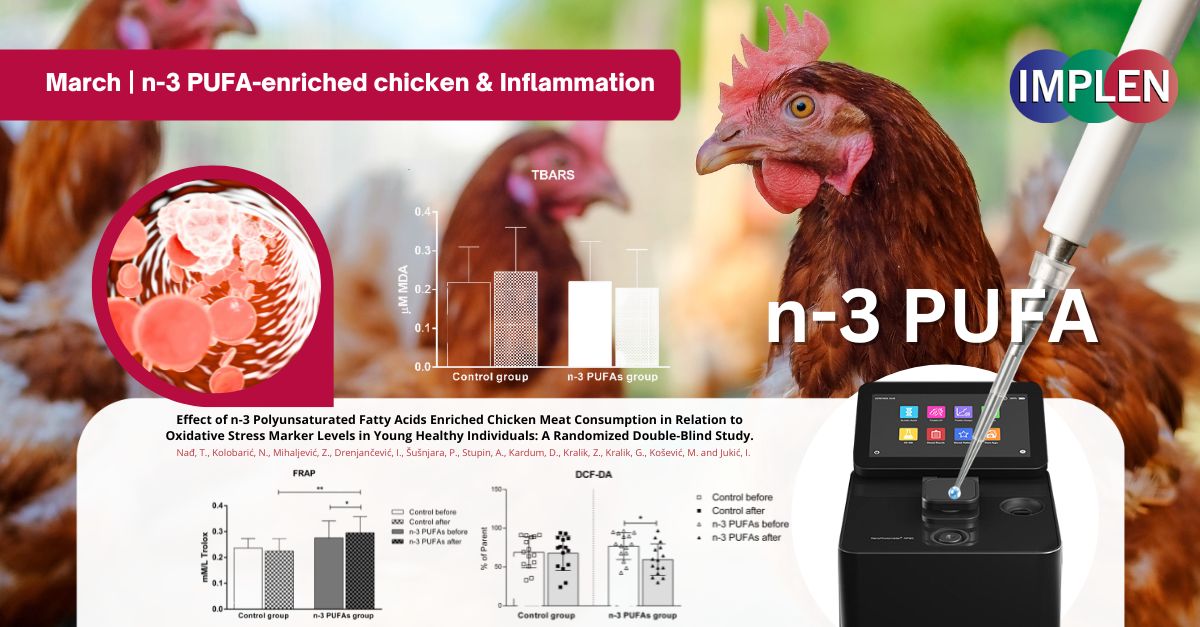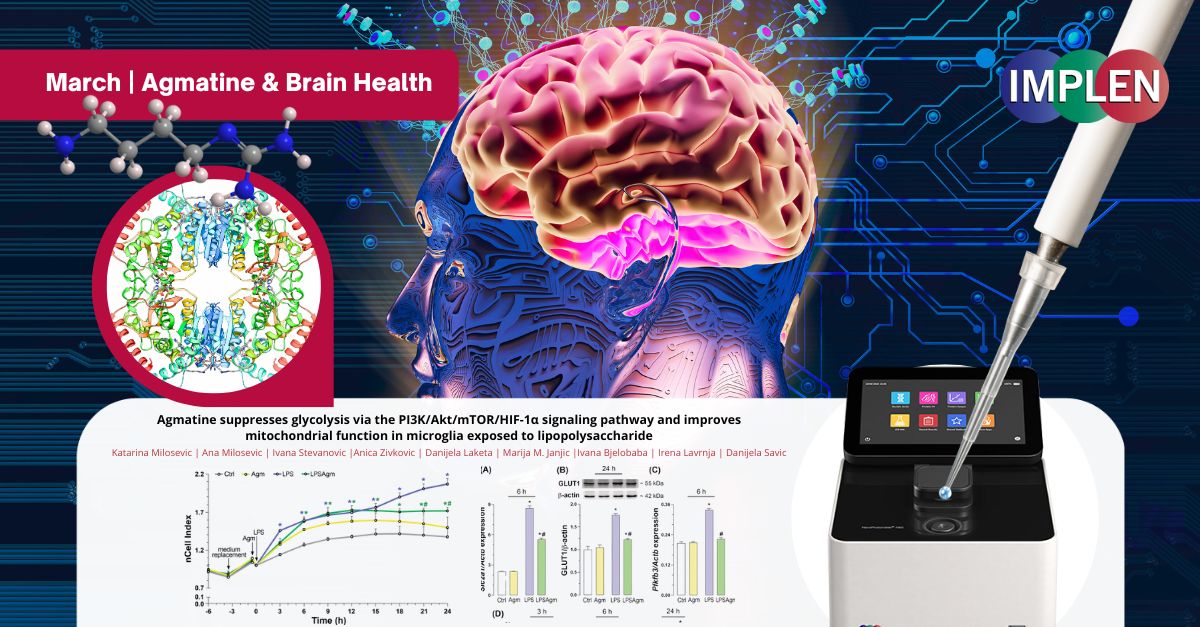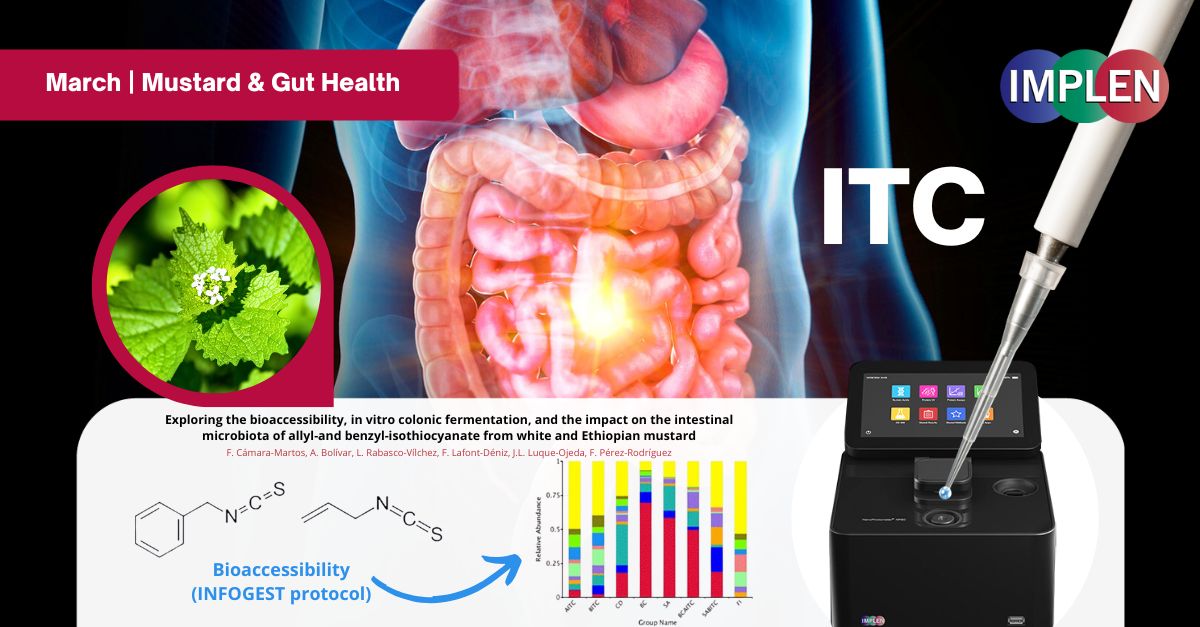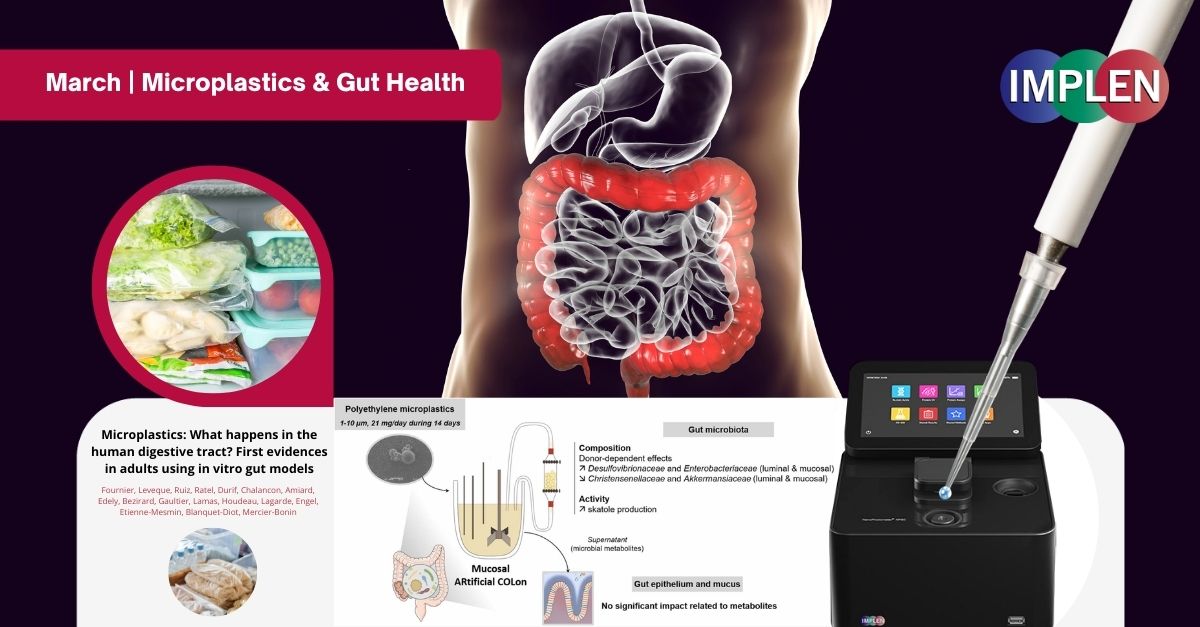Implen Journal Club | March Issue |
|
Boost Your Health This National Nutrition Month: The Power of n-3 PUFA-Enriched FoodsThe first issue, Nutrition Awareness Edition, is putting the focus on a study recently published by Nađ et. al. in the journal of antioxidants highlighting the importance of dietary choices by demonstrating how consuming n-3 PUFA-enriched chicken can boost antioxidant defenses and reduce inflammation in healthy individuals. This study explored the effects of eating chicken meat enriched with n-3 polyunsaturated fatty acids (PUFAs) on oxidative stress in healthy young adults. Over three weeks, 39 participants were randomly assigned to eat either regular chicken or chicken enriched with about 1500 mg of n-3 PUFAs daily. Markers of oxidative stress and inflammation were measured before and after the trial. The results showed that consuming n-3 PUFA-enriched chicken significantly lowered high-sensitivity C-reactive protein (hsCRP), a marker of inflammation, and boosted antioxidant defense, as measured by increased ferric-reducing ability (FRAP). Additionally, two key antioxidant enzymes—glutathione peroxidase (GPx) and superoxide dismutase (SOD)—showed increased activity, while the production of harmful reactive oxygen species (ROS) in immune cells decreased. This suggests that eating n-3 PUFA-enriched chicken meat could enhance the body’s antioxidant capacity and reduce inflammation, even in healthy individuals without underlying health conditions. This improvement could offer protective effects against diseases linked to oxidative stress and inflammation. The study supports the idea that functional foods—those providing health benefits beyond basic nutrition—could be an easy, everyday way to improve overall health. The Implen NanoPhotometer® Spectrophotometer was utilized in this study to measure serum biomarkers of oxidative stress using the TBARS (thiobarbituric acid reactive substances) assay, with UV/VIS detection at 572 and 532 nm. #Implen #NanoPhotometer #UV/VIS #TBARS #NationalNutritionMonth #HealthAndWellness #Antioxidants #PUFAs #FunctionalFoods #InflammationReduction #OxidativeStress #HealthyEating #NutritionScience #WellnessJourney #DietMatters #HealthyLifestyle #ScientificResearch |
|
Fueling Brain Health: The Role of Agmatine and Nutrition in Reducing InflammationContinuing on with the topic of Nutrition Awareness Month, this week's Implen NanoPhotometer Journal Club: Nutrition Awareness Edition, is highlighting how dietary choices can profoundly influence brain health and inflammation management, with a focus on the role of agmatine—a naturally occurring compound that supports mitochondrial function and reduces neuroinflammation. A study recently published by Milosevic et. al. has shown that agmatine can suppress glycolysis in brain immune cells (microglia) and improve mitochondrial health by targeting key pathways like PI3K/Akt/mTOR/HIF-1α. This finding is especially relevant during Nutritional Awareness Month, as it underscores how food choices can directly impact cognitive function and reduce the risk of neurodegenerative diseases. To naturally support agmatine levels through diet, incorporating protein-rich foods—such as lean meats, fish (salmon, mackerel), poultry, and eggs may be beneficial. For plant-based diets, foods including lentils, chickpeas, soybeans, pumpkin seeds, and whole grains (quinoa, oats) support agmatine levels. In the context of neuroinflammation, incorporating these foods could help modulate microglial activity by supporting mitochondrial health and reducing harmful inflammatory responses. A diet rich in natural agmatine sources could serve as part of an integrative nutritional strategy for brain health, potentially aiding in the prevention or management of neurodegenerative diseases. The Implen Nanophotometer® N60 was used in this study to determine RNA concentration and purity. #Implen #NanoPhotometer #N60 #NutritionAwarenessMonth #BrainHealth #Agmatine #Neuroinflammation #CognitiveHealth #MitochondrialHealth #FoodAsMedicine #HealthyEating #InflammationSupport #Microglia #DietAndWellness #NutritionalScience #HolisticHealth #FunctionalNutrition #ImplenNanoPhotometer |
|
Unlocking Gut Health: How Mustard-Derived Compounds Shape Our MicrobiomeWelcome to this week's Implen Nanophotometer Journal Club: Nutrition Awareness Edition, highlighting a study by Cámara-Martos et al. in the journal of Food Research International to explore how mustard-derived isothiocyanates influence gut health and microbiota. This study explored how compounds called allyl- and benzyl-isothiocyanates (ITCs) from Ethiopian and white mustard impact gut health. These compounds, found in cruciferous vegetables including broccoli and mustard, are known for their antioxidant, anti-inflammatory, and anti-cancer properties. In this research, human digestion was simulated to identify how much of these ITCs become available for the body to absorb. It was found that only about 26% of the ITCs were bioaccessible in the small intestine, mainly due to their poor water solubility. Fresh mustard provided more bioaccessible ITCs than freeze-dried samples, likely because freezing reduced the levels of the precursors needed to form ITCs. In the large intestine, gut bacteria further processed these compounds. While the amount of ITCs dropped significantly, this didn’t mean they disappeared; rather, they likely transformed into other beneficial substances. The study also showed that ITCs positively influenced gut bacteria, reducing harmful bacteria like Enterobacter and Klebsiella while encouraging beneficial ones such as Bifidobacterium, Faecalibacterium, and Ruminococcus. The findings suggest that ITC-rich foods can promote a healthier gut microbiome, potentially offering dietary strategies to support gut and overall health. Consuming these vegetables with healthy fats might enhance ITC absorption, increasing their health benefits. The Implen NanoPhotometer® NP80 was used in this study to assess the quality of extracted DNA. #NanoPhotometer #Implen #NP80 #GutHealth #Microbiome #NutritionScience #Isothiocyanates #MustardPower #FunctionalFoods #HealthResearch #NutritionAwareness #FoodAsMedicine #ScientificResearch #ImplenNanophotometer #JournalClub |
|
How Microplastics in Our Food Supply May Be Impacting Gut Health: Insights from ResearchIn this week's final issue of the Implen NanoPhotometer Journal Club: Nutrition Edition, the focus is on microplastics, which have increasingly made their way into the food supply. Fournier et al. recently published a study in the Journal of Hazardous Materials that investigates how microplastics (MPs) impact the human digestive system using an advanced lab model designed to mimic human gut conditions. This research specifically examined polyethylene (PE) MPs, one of the most commonly used plastics found in everyday products such as food packaging, and frequently detected in both food and water sources. The study exposed the simulated gut environment to daily doses of PE MPs over a two-week period. The results revealed significant changes in the composition of gut bacteria. Harmful bacteria, including Desulfovibrionaceae and Enterobacteriaceae, increased, while beneficial bacteria, such as Christensenellaceae and Akkermansiaceae, showed a marked decline. Furthermore, the exposure to MPs altered the production of certain gases and metabolites, most notably leading to a significant increase in skatole, a byproduct linked to gut health issues and potential inflammation. Interestingly, despite these microbiome changes, the MPs did not directly damage the gut lining or trigger inflammation in this model. However, the observed shifts in gut bacteria suggest that long-term exposure could carry health risks. These findings emphasize the need for further research, particularly on vulnerable populations to fully understand the potential long-term health consequences of chronic microplastic exposure. The Implen NanoPhotometer® was used in this study to monitor the quantity and quality of extracted RNA samples. #Implen #NanoPhotometer #Microplastics #GutHealth #NutritionResearch #HumanMicrobiome #FoodSafety #EnvironmentalHealth #PublicHealth #ScientificResearch #JournalClub #ImplenNanoPhotometer #HealthRisks #Sustainability #DigestiveHealth #ResearchInsights |
©2025 Implen. All rights reserved.



